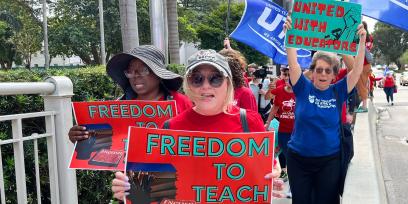DO YOU HAVE a lesson you taught 10 years ago that today might be challenged by students, families, or community members? History teacher Tim Krueger does. As he describes, in 2020 he taught a junior high lesson on voting that he’d taught before each presidential election since 2008. Though the lesson was carefully nonpartisan, administrators at Krueger’s school received eight complaints from parents claiming he was indoctrinating their kids.
Sound familiar? So many of you—from pre-K through higher education—tell me that you feel like you’re teaching on eggshells these days. Like doing your job conscientiously will land you in trouble.
If it feels like the air around you is full of noise and rancor—you’re right. And it’s not by accident. It’s part of a concerted, ruthless war by extremists seeking to destabilize and destroy public education at every level. To that end, they’re waging an all-out campaign to crush academic freedom and honest teaching, and to sow distrust between educators and the students, families, and communities they serve.
What brought this on? A perfect storm: A once-in-a-century pandemic. The brutal murder of George Floyd, and the righteous outrage that followed. Disinformation, social media manipulation, political polarization, and the erosion of civil discourse. Suddenly, the world felt very unsafe. When parents became worried about their children’s future, extremists saw an opportunity.
Our opponents don’t want a “more perfect union.” They want to turn the clock back and make sure that the people who have long been in power keep that power.
They’re exploiting the nation’s anxiety to move their agenda: Weaponizing everything, from pandemic-era safety measures like masks to a children’s book about penguins. Defunding neighborhood public schools with voucher programs for wealthy families. Imposing book bans and curriculum censorship aimed at people of color and LGBTQIA+ youth. Eroding academic freedom and cutting programs at public colleges and universities, making it even harder for students to pursue their dreams. Passing deliberately vague “divisive concepts” laws that endanger teachers’ livelihoods and have a chilling effect in the classroom. (In May, we won a major court victory against such a law in New Hampshire.)
If educators can’t hold mock United Nations debates without fear of getting sued or talk honestly about the Civil War without having a bounty placed on their heads by Moms for Liberty, then other sources (notably TikTok) will fill the vacuum—and our crucial role teaching students how to be critical thinkers, appreciate nuance, and civilly navigate conflict will fall by the wayside. If professors can’t teach freely and advance knowledge in their fields, then students won’t get the range of viewpoints and disciplines higher education should provide.
It’s a war on knowledge and intellectual freedom, and democracy itself is at stake. Indeed, the founders—including George Washington, James Madison, and Alexander Hamilton—at the Constitutional Convention were concerned about one thing above all: demagogues. Hamilton even predicted the rise of tyranny because of self-aggrandizing politicians who prey on people’s fears.
The question is what to do about it. This issue of American Educator explores policy and practice that can protect our freedom to teach, our students’ freedom to learn, and ultimately all our freedoms. The articles show how to
- grapple with real challenges, like when a student’s use of the freedom of discussion provided in the classroom diverges from the purpose of a class and disrupts other students’ freedom to learn;
- fight misinformation by inviting families and communities into schools, showcasing what’s being learned, and centering students’ voices—especially when book banning or curriculum censoring is proposed; and
- forge bipartisan coalitions across academic disciplines, institutions, and school districts and throughout preK–20 to strengthen and defend academic freedom, whether on campus, in the community, or in the voting booth—and especially in school board elections.
Families are with us in this fight: New polling from Hart Research shows public school teachers and our unions are at their highest approval ratings ever recorded—teachers at 71 percent and teacher unions gaining 26 points since 2010. Polling also shows that parents don’t want public schools to be pawns for politicians’ ambitions or extremists’ agendas. They’re with us in fighting for real solutions to help kids thrive and have better, fuller, freer lives.
This is the work of a great nation—and our great union. A great nation does not fear people being educated. It does not fear pluralism. A great nation chooses freedom, democracy, equality, and opportunity—brought to life in public schools and colleges. And at the AFT, we will never tire in fighting for our rights and for a better life for all.

